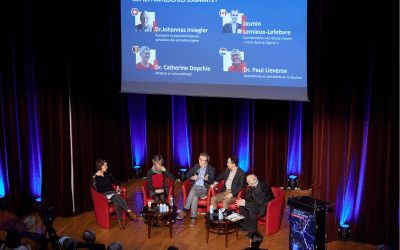The 7th Annual National Day for Caregivers was held on October 6, 2016. Throughout France a number of events took place to mark this event. This country alone has over 11 million caregivers: individuals who take care of a relative facing loss of autonomy, due to advanced age or a handicap. Included in this number are 4 million family caregivers.
According to a “BVA” survey¹ published yesterday by the APRIL Foundation, family caregivers are predominately working individuals (58%) the majority of whom are women (62%) taking care of a loved one free of charge, with 80% under 65 years old. More than half (53%) state taking take of a loved one due to old-age dependency, 33% for a sick family member, and 30% due to a handicap.
Paradoxically, this phenomenon is growing and is expected to increase dramatically, as one third of the population will be over 60 years of age by 2050, with many unknown variables yet to be discovered…
The main challenges that caregivers are confronted with while accompanying other individuals are: lack of time (35%), physical tiredness (26%) and the complexity of administrative procedures (22%). Nevertheless, 86% believe that their efforts “have a positive impact” for improving the quality of life and the relationship with the individual, even boosting their moral.
How to “care for caregivers”?
Companies are becoming increasingly aware of this issue. To give time off to their salaried workers, some have chosen to give anonymous gifts of vacation and overtime days (allowed by the 2014 “Mathys” law). Other ideas are emerging. For example, companies such as Mutex or ASAP organize workshops on accompaniment for workers and companies on the subject of advanced age.
Since January 2016, the French Act on Adapting Society to an ageing population grants caregivers a “right for a respite period”, an allowance up to 500 € per year to spend a few days in a specialized center or to have a few extra hours of home help assistance.
Next year salaried caregivers will also benefit from a “caregiver’s vacation” for a renewable 3-month period, in order to better “reconciliate professional and personal life”, according to Pascale Boistard, French Minister of State in charge of Elderly People and Adult Care.
Henri de Soos, Director of Alliance VITA’s SOS End of Life ² Crisis Center confirms:
“Those who contact us either by mail or by telephone, are often caregivers of individuals who are going through a difficult time at the end of life. Caregivers play a major role in accompanying a parent, a neighbour or a friend, with discretion, perseverance and vigilant tenderness. We realize the extent of their daily implication, but also their inner suffering when faced with unpredictable, uncontrollable situations. Sometimes, the weight is too heavy to bear, and we advise them to take some time off for themselves, to step back, and to accept support. Otherwise, a situation of burn-out may occur, leading to conflicts with other family members or with medical professionals. Caring for caregivers is a genuine goal of national solidarity and public health.”
________________________________
¹ According to a telephone survey carried out 20-21 May and 27-28 May 2016 representing 2008 individuals (quota method). This sample population included 385 caregivers and 1623 non-caregivers.
² Web site SOS End of Life: http://www.sosfindevie.org



